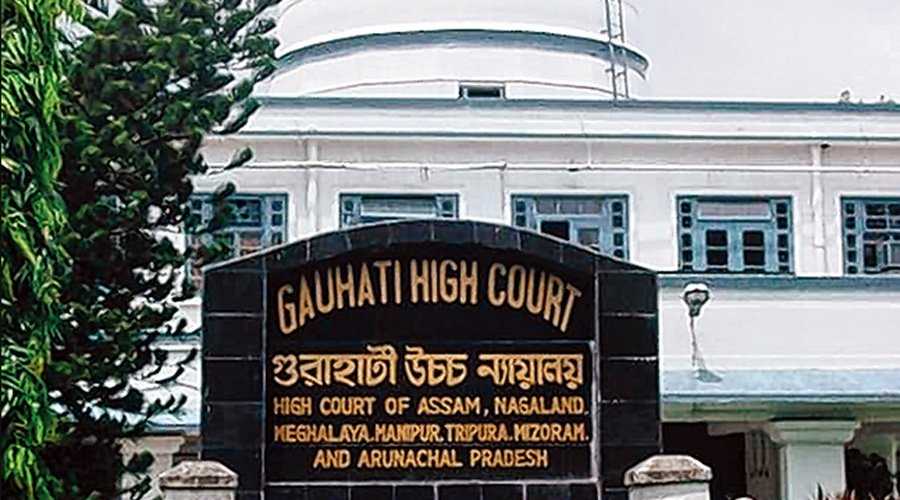A ruling by Gauhati High Court that a person cannot be declared a foreigner just because he could not establish his linkage with all his relatives on the voter list has been hailed as a “landmark” judgment that will “substantially reduce the arbitrariness” of the foreigners tribunals.
The tribunals are quasi-judicial bodies that determine whether a resident is a “foreigner” or not.
Justice N. Kotiswar Singh had on March 30 passed the judgment on a writ petition by Haider Ali, son of Harmuz Ali, from Assam’s Barpeta district.
The petition challenged the Barpeta Foreigners Tribunal ruling declaring him a foreigner on January 30, 2019, for having failed to prove his linkage with his relatives on the voter list.
Ali, 33, had established his linkage with his grandfather and father, both of whom featured on the voter lists of 1965 and 1970 and owned properties in Assam before 1971, documents whose admissibility was not rebutted by the tribunal.
The high court said the documents submitted by Ali certainly indicate his father and grandfather were in possession of properties in Assam before 1971 and this can be considered as corroborating evidence to show the petitioner is a descendant of people who were already living in Assam before 1971 and 1966.
The cut-off date for detection and deportation of illegal foreigners is March 24, 1971, according to the 1985 Assam Accord, an outcome of the six-year-long anti-foreigners movement.
“The documents clearly show the linkage of the petitioner with his father Harmuz Ali and grandfather Nadu Miya and accordingly, we have no hesitation to hold that the petitioner is an Indian citizen and not a foreigner,” the court said.
Zamser Ali, the former chief adviser of the Assam chapter of the Citizens for Justice and Peace (CJP), and advocate Aman Wadud hailed the “landmark” ruling, saying it will be a sigh of relief to those trying to prove their citizenship in the tribunals. Ali and Wadud are involved in helping those facing such cases.
“This is a very reasonable judgment, it upholds the rule of law and principle of natural justice, which the foreigners tribunals were routinely overlooking. This landmark judgment will substantially reduce the arbitrariness of the tribunals,” Wadud told The Telegraph.
Ali said the ruling will also be a huge relief to those who have been excluded from the updated National Register of Citizens when they approach the tribunals.
There are 100 foreigners tribunals in Assam handling over 1.4 lakh doubtful citizenship cases.
Over 19 lakh applicants, who have been excluded from the NRC, are expected to defend their citizenship before the tribunals. The cut-off date for inclusion in the NRC was March 24, 1971.
“The high court ruling has addressed vital issues, including observation on the functioning of the foreigners tribunals and submission of evidence to bolster one’s case. This ruling will definitely impact ongoing cases and those excluded from the NRC,” Ali said.
Senior advocate H.R.A. Choudhury echoed him.
Allen Brooks, former member of the Assam State Commission for Minorities, said the ruling would hopefully lead to a much-needed course correction.
“The honourable court has gone into all aspects of the case and has upheld the constitutional right of a citizen. It has also sent a strong message to the foreigners tribunals on how they should function,” Brooks said.
The high court had also said that not mentioning his other relatives cannot be a ground for disbelieving his testimony and the documents relied upon by the petitioner.
Apart from the linkage, the court also made observations about the functioning of the foreigners tribunals, which “merely” issue a notice to the proceedee informing that he or she is an illegal entrant to the state and India for a certain specific period of time “without any other facts and documents being furnished to him”. “From the records, it is also seen that after issuing summons to the proceedee or before issuing summons to the proceedee, the tribunal does not examine any of the persons who had made the reference or who had conducted the investigation against the proceedee to hold that the proceedee is a foreigner. Thus, the proceedee is totally in dark as to how he came to be considered to be a foreigner and not an Indian,” the court said.
The court also has observed that since the burden of proof as to whether a person is an illegal foreigner or not is upon the person as provided under Section 9 of the Foreigners Act, 1946, he must be “afforded all the opportunities” to furnish evidence.
“Therefore, if certain facts are introduced subsequently, which does not contradict his statement or stand taken in his written statement, introduction of such fact subsequently cannot cause any prejudice to the proceedee. In fact, a proceedee must be afforded all the opportunities to prove his case and no hyper technical view should be taken to deny introducing new facts or document, so long as these are relevant and bolster the case of the proceedee... so long as the State does not adduce evidence to rebut the claim of the proceedee, the Tribunal ought not to disallow filing or introduction of new facts/documents not mentioned in the written statement,” the ruling said.










